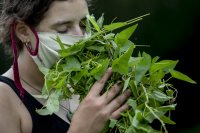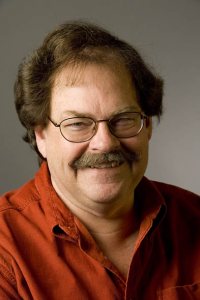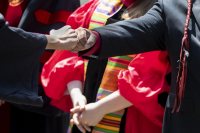
With contemporary interest, Society of Antiquaries elects Michael Jones as Fellow
When Professor of History Michael Jones learned of his recent election as a Fellow of the Society of Antiquaries of London earlier this year, he did what anyone in his field would do.
He put the good news into historical perspective.
“Perhaps what triggered interest in my work is the society’s interest in pushing deeper into the story of Britain before the Norman conquest, in 1066,” explains Jones. While Britain’s documentary trail after 1066 is “almost continuous,” he says, the story before the conquest is “very discontinuous, sometimes almost nonexistent.”
As a researcher, Jones has helped to reconstruct a key chapter of Britain’s otherwise hazy pre-Norman history. Specifically, his scholarship explains the comings and goings of peoples and cultures beginning around the fifth century: Romans going, Angles and Saxons coming, and the Britons being pushed around.
Michael Jones tells a story about the search for archeological evidence of the original King Arthur.
Jones explains some of these changes with a theory that has a contemporary ring. He believes that rapid climate change — colder and wetter — beginning around the fifth century led to famine and economic and social disruption in Britain.
“Maintaining trade, a level of urbanization, armies and government ought to have become significantly harder in a world suffering environmental change and reduced production in the countryside,” Jones says. Thus weakened, Britons were no match for the Angles and Saxons.
To arrive at this conclusion, first published in his book The End of Roman Britain, Jones used tools from archeology, history, geology and geography. He took part in archeological excavations in Gloucester and Essex in England, and at a Roman fort in Wales, known as Segontium, where researchers kept an eye out for evidence of the “original” King Arthur (see video, above). He examined ancient pollen counts, peat layers and tree rings. He studied the record of grain rations for Roman soldiers. And he learned about weather patterns.
Jones’ research also challenged a longstanding assumption about pre-Norman population in Britain, long assumed to be small, around 200,000. Instead, the population may have been in the millions before being cut down by famine.
Taken together, Jones’ theories challenge “old notions of a small, culturally unimportant Celtic world displaced by Anglo-Saxon invaders,” notions that deeply influence contemporary English self-identity. Writing in Romans, Barbarians and the Transformation of the Roman World, published in 2011, the Anglo-Saxon transformation of Britain “holds wide popular interest. It goes to the root of nationalism and identities in modern Britain.”
(In October at Bates, Jones will address these topics during the 38th Annual New England Medieval Conference, whose theme is Medieval Miseries: Responses to Hard Times. His talk is titled “The Worst of Times and the Worst of Times: Climate, Famine and Pestilence during the Medieval Transitions.”)
As a Fellow of the Society of Antiquaries, Jones joins a learned order charged with furthering the “study and knowledge of antiquities and history of this and other countries.” As such, Fellows come from the fields of archeology, architecture, anthropology, history and art, and related fields like archaeometallurgy and archeozoology. They’ve studied everything from pew arrangements in English parish churches to the Portuguese shipwreck discovered in a nearshore diamond mine off the coast of South Africa.
Headquartered in Burlington House on Piccadilly, the society offers its Fellows access to one of the world’s finest archeological libraries. Studying there “is like “communing with ghosts,” Jones quips.
Chartered in 1751, the society inherits its collaborative spirit from its birth during the Enlightenment, when the zeal to create of knowledge transcended nationalism. “Even during Napoleonic wars, scholars moved freely between France and Britain to help each other,” Jones says.
The society is currently co-sponsoring a major U.S. exhibition at the McMullen Museum of Art at Boston College, Making History: Antiquaries in Britain, through Dec. 11, 2011.
Jones also gains an entrée to a community of scholars eager to share ideas across interdisciplinary boundaries, not to mention national and cultural ones. “What matters most are the informal contacts you make,” he says. “People begin to communicate research results with you. They invite you into their projects.”
And, he can invite others into his.
Jones is part of an interdisciplinary research team from Bates, supported by a National Science Foundation grant of $619,000, cooperating with British scholars to study a farming settlement in the Shetland Islands. Hundreds of years ago, the settlement was buried by sand, possibly driven by storms of historic force during the so-called Little Ice Age in the 17th century.
Like Jones’ important research in England, this project seeks to understand the historical interplay of climate change and human activity, to gain better insights into how these forces affect the world today.





